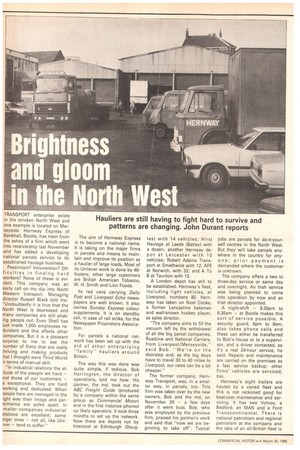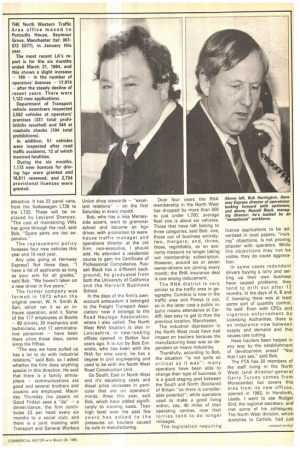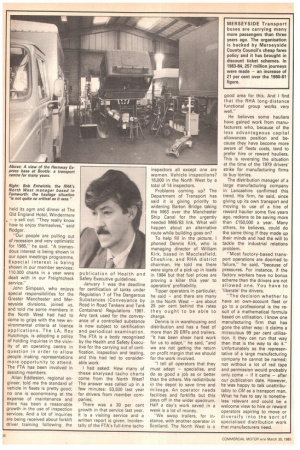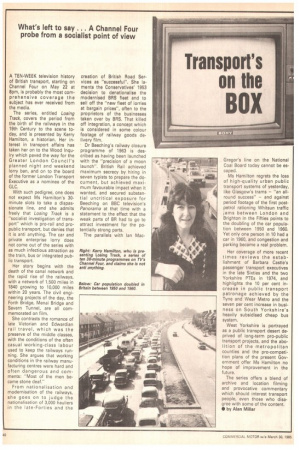TRANSPORT enterprise exists in the stricken North West and one
Page 40

Page 41

Page 42

Page 44

If you've noticed an error in this article please click here to report it so we can fix it.
example is located on Merseyside. Hernway Express of Bankhall, Bootle, has risen from the ashes of a firm which went into receivership last November and has added a developing national parcels service to its established haulage business.
Pessimism? Introversion? Difficulties in finding hard workers? None of these is evident. This company was an early call on my dip into North Western transport. Managing director Russell Black told me: "Undoubtedly it is true that the North West is depressed and many companies are still shaking people out. Even Shell has lust made 1,000 employees redundant and this affects other ompanies. But it is a pleasant surprise to me to see the lumber of firms that are really :hriving and making products :hat I thought were Third World n terms of manual skill.
"In industrial relations the atitude of the pwopie we have — Ind those of our customers — s exceptional. They are hard vorking and dedicated. When )eople here are managed in the ight way their image and perormance are poles apart. In mailer companies industrial elations are excellent; some 3rger ones -not all, like Uni,wer — tend to suffer." The aim of Hernway Express is to become a national name. It is taking on the major firms in parcels and means to maintain and improve its position as a haulier of large loads. Most of its Unilever work is done by 40footers; other large customers are British American Tobacco, W. H. Smith and Lion Foods.
Its red vans carrying Daily Post and Liverpool Echo newspapers are well known. It also carries Sunday Express colour supplements. It is on standby call, in case of rail strike, for the Newspaper Proprietors Association.
For parcels a national network has been set up with the aid of other enterprising "family" hauliers around Britain.
The way this was done was quite simple, if tedious. Bob Harrington, the director of operations, told me how. His partner, the md, took out the ABC Freight Guide (produced by a company within the same group as Commercial Motor) and in the first instance phoned up likely operators. It took three months to set up the network. Now there are depots run by lnterscot at Edinburgh (Doug
las) with 14 vehicles; Hirst Haulage at Leeds (Batley) with a dozen; another Hernway depot at Leicester with 10 vehicles; Robert Adams Transport at Smethwick with 12, AFE at Norwich, with 33; and A To B at Taunton with 13.
A London depot has still to be established. Hernway's fleet, including light vehicles, at Liverpool, numbers 80. Hernway has taken on Noel Cooke, a former Lancashire batsman and well-known hockey player, as sales director.
"The company aims to fill the vacuum left by the withdrawal of all the big parcel companies, Roadline and National Carriers, from Liverpool/Merseyside," said Bob. "We're on the doorstep and, as the big boys have to travel 30 to 40 miles to Liverpool, our rates can be a bit cheaper."
The former company, Hernway Transport, was, in a smaller way, in parcels, too. This firm was taken over by the new owners, Bob and the md, on November 26 a few days after it went bust. Bob, who was employed by the previous firm, praised his partner's work and said that "now we are beginning to take off". Typical jobs are parcels for do-it-yourself centres in the North West. But they will take parcels anywhere in the country for anyone; prior payment is demanded where the customer is unknown.
The company offers a two to three-day service or same day and overnight. An Irish service was being planned to come into operation by now and an Irish director appointed.
A night-shift 9.30pm to 6.30am — at Bootle makes this sort of service possible. A security guard, 6pm to 8am, also takes phone calls and these can either be transferred to Bob's house or to a supervisor, and a driver contacted, so it's a real 24-hour service, he said. Repairs and maintenance are carried on the premises as a fast service backup; other firms' vehicles are serviced, too.
Hernway's eight trailers are hauled by a varied fleet and this is not reckoned good for best-cost maintenance and servicing. It has two Volvos, a Bedford, an MAN and a Ford Transcontinental. There is national patriotism and regional patriotism at the company and the idea of an all-British fleet is attractive. It has 22 panel vans, from the Volkswagen LT28 to the LT35. These will be replaced by Leyland Sherpas. "The cost of maintaining VWs has gone through the roof, said Bob. "Spare parts are too expensive."
The replacement policy foresees four new vehicles this year and 10 next year.
Any jobs going at Hernway Express? Not these days. "I have a list of applicants as long as your arm for all grades," said Bob. "We haven't taken on a new driver in five years."
The former company was formed in 1973 when the original owner, W. H. Smith & Son, which ran it as an inhouse operation, sold it. Some of the 117 employees at Bootle — 80 drivers, 20 mechanics and technicians, and 17 administrative personnel — have been there since those days, some since the Fifties.
"The way we have pulled up has a lot to do with industrial relations," said Bob, so I asked whether the firm does anything special in this direction. He said that there is a family atmosphere — communications are good and several brothers and cousins are employed. Maunday Thursday (no papers on Good Friday) sees a "do" — a dinner/dance; the firm contributes £3 per head every six months to a social club; and there is a joint meeting with Transport and General Workers Union shop stewards — "excellent relations" — on the first Saturday in every month.
Bob, who has a nice Merseyside accent, went to grammar school and became an hgv driver, with promotion to warehouse traffic manager and operations director at the old firm; non-executive, I should add. He attended a residential course to gain his Certificate of Professional Competence. Russell Black has a different background; he graduated from both the University of California and the Harvard Business School.
In the days of the firm's ownaccount antecedent it belonged to the Freight Transport Association; now it belongs to the Road Haulage Association, where I also called. The North West RHA location is also in Lancashire, in new-looking offices opened in Bolton four years ago. It is run by Bob Entwistle, who has been with the RHA for nine years; he has a degree in civil engineering and used to be with the North West Road Construction Unit.
Go South, East or North West and it's escalating costs and diesel price increases in particular that are on operators' minds; three this year, said Bob, which have added significan,tly to running costs. Their high level over the past few years has added to the pressures on hauliers caused by cuts in manufacturing. Over four years the RHA membership in the North West has dropped by more than 600 to just under 1,700; average fleet size is about six vehicles. Those that have left belong to three categories, said Bob: one, those out of business entirely; two, mergers; and, three, those, regrettably, as an economy measure no longer taking out membership subscription. However, around six or seven owner-drivers are joining every month; the RHA insurance deal is one strong inducement.
The RHA district is very similar to the traffic area in geography. Cumbria is now in the traffic area and Powys is out, so in the latter case a public inquiry means attendance at Cardiff, less easy to get to than the previous location, Manchester.
The industrial depression in the North West must have had impact on hauliers because the manufacturing base was so dependent on heavy industries.
Thankfully, according to Bob, the situation "is not quite so critical as it was"; many operators have been able to change their type of business. It is a good staging post between the South and North (Scotland) of Britain "so there is considerable potential"; while operators used to make a good living within, say, 40 miles of their operating centres, now their lorries tend to do longer mileages.
The legislation requiring licence applications to be advertised in local papers, "inviting" objections, is not proving popular with operators. While the objections may not be viable, they do cause aggravation.
In some cases redundant drivers buying a lorry and setting up their own business have caused problems; they tend to drift out after 12 months. In the days of A, B and C licensing there was at least some sort of quantity control, he said. Even with CPCs and vigorous enforcement by Licensing Authorities, there is an imbalance now between supply and demand and this causes rate cutting.
Have hauliers been helped in any way by the establishment of development areas? "Not that I can see," said Bob.
The FTA has 20 members of the staff living in the North West (and director-general Garry Turvey comes from Morecambe) but covers this area from its new offices, opened in 1983, in Horsforth, Leeds. I went to see Rodger Bird, the regional secretary, and met some of his colleagues. The North West division, which stretches to Carlisle, had just held its agm and dinner at The Old England Hotel, Windermere , — a sell out. "They really know how to enjoy themselves," said Rodger.
"Our people are pulling out of recession and very optimistic for 1985," he said. "A tremendous interest is being shown in our open meetings programme. Especial interest is being shown in our member services; 110.000 charts in a year were dealt with in our Freightcheck service," John Simpson, who enjoys special responsibilities for the Greater Manchester and Merseyside divisions, joined us, and told me some members in the North West had had to come to grips with the new environmental criteria at licence applications. The LA, Roy Hutchings, is adopting a policy of holding inquiries in the vicinity of an operating centre in question in order to allow people making representations more opportunity to attend. The FTA has been involved in assisting members.
Allan Eddleston, regional engineer, told me the standard of vehicle in fleets is pretty good; no one is economising at the expense of maintenance and there has been a reasonable growth in the use of inspection services. And a lot of inquiries are being received about forklift driver training following the publication of Health and Safety Executive guidelines.
January 1 was the deadline for certification of tanks under Regulation 7 of The Dangerous Substances (Conveyance by Road in Road Tankers and Tank Containers) Regulations 1981. Any tank used for the conveyance of a controlled substance is now subject to certification and periodical examination. The FTA is a body recognised by the Health and Safety Executive for the carrying out of certification, inspection and testing, and this had led to considerable work.
I had asked: How many of these analysed tacho charts come from the North West? The answer was called up in a few minutes: 53,500 last year for drivers from member companies.
There was a 30 per cent growth in that service last year. It is a visiting service and a written report is given. Incidentally of the FTA's full-time tacho inspectors all except one are women. Vehicle inspections? 16,000 in the North West by a total of 14 inspectors.
Problems coming up? The Department of Transport has said it is giving priority to widening Barton Bridge taking the M63 over the Manchester Ship Canal for the urgently needed M66/63 link. What will happen about an alternative route while building goes on?
To help fill in the picture, I phoned Dennis Kirk, who is managing director of William Kirk, based in Macclesfield, Cheshire, and RHA district chairman. He told me there were signs of a pick up in loads in 1984 but that fuel prices are proving a killer this year to operators' profitability.
Tipper operators in particular, he said — and there are many in the North West — are about 25 per cent behind the rates they ought to be able to charge.
Dennis is in warehousing and distribution and has a fleet of more than 20 ERFs and trailers. "It has been sheer hard work for us to adapt," he said, "and we are not getting the return on profit margin that we should for the work involved.
"I tell all operators that they must adapt — specialise, and do as good a job as or better than the others. We redistribute in the depot to save time and mileage. An operator needs facilities and forklifts but this pays off in the wider spectrum. Half a day's work saved in a week is a lot of money.
"We swop trailers, for instance, with another operator in Scotland. The North West is a good area for this. And I find that the RHA long-distance functional group works very well."
He believes some hauliers have gained work from manufacturers who, because of the less advantageous capital allowances position and because they have become more aware of fleets costs, tend to prefer hire or reward hauliers. This is reversing the situation at the time of the 1979 drivers' strike for manufacturing firms to buy lorries.
The distribution manager of a large manufacturing company in Lancashire confirmed this trend. His firm, he said, since giving up its own transport and moving to use of a hire of reward haulier some five years ago, reckons to be saving more than £150,000 a year. Many others, he believes, could do the same thing if they made up their minds and had the will to tackle the industrial relations problem.
"Most factory-based transport operations are doomed to failure," he said, "because of pressures. For instance, if the factory workers have no bonus scheme then the drivers are not allowed one. You have to 'liberate' the drivers.
"The decision whether to have an own-account fleet or go to a professional is the result of a mathematical formula based on utilisation. I know one manufacturing firm that has gone the other way: it claims a miraculous 99 per cent utilisation. It they can run that way then that is the way to do it." Unfortunately as the representative of a large manufacturing company he cannot be named; not without a lot of red tape and permission would probably only come — if it came — after our publication date. However, he was happy to talk unattributably to CM as a transport man. What he has to say is nonetheless relevant and could be a welcome view to hire or reward operators aspiring to move or diversify into the sort of specialised distribution work that manufacturers need.
A TEN-WEEK television history of British transport, starting on Channel Four on May 22 at Bpm, is probably the most comprehensive coverage the subject has ever received from the media.
The series, entitled Losing Track, covers the period from the birth of the railways in the 19th Century to the scene today, and is presented by Kerry Hamilton, a historian. Her interest in transport affairs has taken her on to the Wood Inquiry which paved the way for the Greater London Council's planned night and weekend lorry ban, and on to the board of the former London Transport Executive as a nominee of the GLC.
With such pedigree, one does not expect Ms Hamilton's 30minute slots to take a dispassionate line, and she admits freely that Losing Track is a "socialist investigation of transport" which is pro-rail and propublic transport, but denies that it is anti anything. The car and private enterprise lorry does not come out of the series with as much infectious attraction as the train, bus or integrated public transport.
Her story begins with the death of the canal network and the rapid rise of the railways, with a network of 1,500 miles in 1840 growing to 10,000 miles within 20 years. The civil engineering projects of the day, the Forth Bridge, Menai Bridge and Severn Tunnel, are all commemorated on film.
She contrasts the romance of late Victorian and Edwardian rail travel, which was the preserve of the middle classes, with the conditions of the often casual working-class labour used to keep the railways running. She argues that working conditions in the railway manufacturing centres were hard and often dangerous and comments: "Most of the men became stone deaf."
From nationalisation and modernisation of the railways, she goes on to judge the nationalisation of 3,000 hauliers in the late-Forties and the creation of British Road Services as "successful". She laments the Conservatives' 1953 decision to denationalise the modernised BRS fleet and to sell off the "new fleet of lorries at bargain prices", often to the proprietors of the businesses taken over by BRS. That killed off integration, a concept which is considered in some colour footage of railway goods delivery film.
Dr Beeching's railway closure programme of 1963 is described as having been launched with the "precision of a moon launch". British Rail achieved maximum secrecy by hiring in seven typists to prepare the document, but achieved maximum favourable impact when it wanted, and secured substantial uncritical exposure for Beeching on BBC television's Panorama at that time with a statement to the effect that the weak parts of BR had to go to attract investment for the potentially strong parts.
The parallels with Ian Mac Gregor's line on the National Coal Board today cannot be escaped.
Ms Hamilton regrets the loss of high-quality urban public transport systems of yesterday, like Glasgow's trams — "an allround success" — and against period footage of the first postpetrol rationing Whitsun traffic jams between London and Brighton in the Fifties points to the doubling of the car population between 1950 and 1960. Yet only one person in 10 had a car in 1960, and congestion and parking became a real problem.
Her coverage of more recent times reviews the establishment of Barbara Castle's passenger transport executives in the late Sixties and the two Yorkshire PTEs in 1974, and highlights the 10 per cent increase in public transport patronage achieved by the Tyne and Wear Metro and the seven per cent increase in business on South Yorkshire's heavily subsidised cheap bus system.
West Yorkshire is portrayed as a public transport desert deprived of long-term pro-public transport projects, and the abolition of the metropolitan counties and the pro-competition plans of the present Government offer Ms Hamilton no hope of improvement in the future.
The series offers a blend of archive and location filming and provocative commentary which should interest transport people, even those who disagree with some of the content.
• by Alan Millar
























































































































































